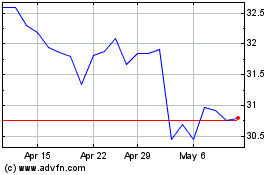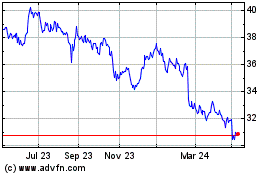Nordstrom Buys Stake in Software Firm to Aid E-Commerce
July 08 2016 - 9:30AM
Dow Jones News
Nordstrom Inc. has acquired a minority stake in a supply-chain
software firm, part of the luxury retailer's effort to fulfill a
growing number of online orders without sacrificing profits.
DS Co., based in Lehi, Utah, provides a cloud-based service that
makes it easier for suppliers to directly ship orders placed
through their retail partners. For example, if a customer purchases
a handbag on Nordstrom's website, the order would be routed to the
manufacturer, which would then ship the item from its warehouse to
the buyer's door.
This method of delivery, known as "drop shipping," can reduce
retailers' costs by requiring them to hold less inventory.
Nordstrom's investment in the technology company comes as retailers
are racing to compete with e-commerce companies such as Amazon.com
Inc. to provide convenience and speedy delivery to customers while
keeping costs down. And as the rising expenses of doing both
e-commerce and brick-and-mortar businesses are squeezing their
margins, experts say an increasing number are putting pressure on
suppliers to help bear some of the cost.
In May, Nordstrom reported a $46 million profit in its latest
quarter, down from $128 million a year earlier, and lowered sales
projections for the year to between a 1% decline and a 1% increase
as its finance chief, Michael Koppel, said the company was
executing "a number of initiatives to increase efficiencies across
our supply chain and marketing functions."
DS Co., which sells its platform under the name Dsco, acts like
a middle man between the software systems that retailers and their
suppliers use to track inventory and orders. They pull data from
both sides and communicate any surges in orders or depleted
inventory. In doing so they aim to solve a common problem in
retail, where companies use different methods to track inventory
data, making it difficult to share the data and ensure that
products are in stock and can be shipped out in time.
Drop shipping is one way that suppliers are helping retailers,
because it reduces the cost and the risk of holding inventory. In
some cases, retailers may stock only popular colors of a certain
item, but make a broader array of colors available to customers via
drop shipping. Some retailers may choose drop shipping rather than
order large quantities of a new product, to reduce the risk they
are left with unsold inventory if sales disappoint.
"They're shifting the risk of the inventory up the supply chain
to their suppliers," said Irv Grossman, executive vice president at
consulting firm Chainalytics.
Having suppliers hold inventory and do shipping "is the best way
a retailer can expand their offerings and compete against Amazon
without carrying inventory risk," Mr. Grossman said.
Allowing retailers and suppliers to track each other's
inventories can also reduce the odds that a consumer will buy a
product, only to find out later it's out of stock, said Jeremy
Hanks, Dsco's founder. He said such mistakes can lead to
disappointed customers.
The investment from Nordstrom will be used to expand the
software company's technology team and develop more data analysis
capabilities, such as using historical inventory levels to predict
the likelihood of shortages, Mr. Hanks said. Other Dsco users
include Sharper Image Corp., Woolworths Ltd. and Modell's Sporting
Goods.
"Dsco is helping to improve [customers'] online experience by
reducing complexity in our supply chain," said Ken Worzel,
executive vice president of strategy and development at
Nordstrom.
He added that Nordstrom plans to make more investments in
companies like Dsco.
(END) Dow Jones Newswires
July 08, 2016 10:15 ET (14:15 GMT)
Copyright (c) 2016 Dow Jones & Company, Inc.
Woolworths (ASX:WOW)
Historical Stock Chart
From Dec 2024 to Jan 2025

Woolworths (ASX:WOW)
Historical Stock Chart
From Jan 2024 to Jan 2025
